Finding Reliable Information Online
Finding Reliable Information Online
Adventures of an Information Sleuth
Leslie F. Stebbins
ROWMAN & LITTLEFIELD
Lanham Boulder New York London
Published by Rowman & Littlefield
A wholly owned subsidiary of The Rowman & Littlefield Publishing Group, Inc.
4501 Forbes Boulevard, Suite 200, Lanham, Maryland 20706
www.rowman.com
Unit A, Whitacre Mews, 26-34 Stannary Street, London SE11 4AB
Copyright 2015 by Rowman & Littlefield
All rights reserved. No part of this book may be reproduced in any form or by any electronic or mechanical means, including information storage and retrieval systems, without written permission from the publisher, except by a reviewer who may quote passages in a review.
British Library Cataloguing in Publication Information Available
Library of Congress Cataloging-in-Publication Data
Stebbins, Leslie F., 1958
Finding reliable information online : adventures of an information sleuth / Leslie F. Stebbins.
pages cm
Includes bibliographical references and index.
ISBN 978-1-4422-5392-6 (cloth : alk. paper) ISBN 978-1-4422-5393-3 (pbk. : alk. paper) ISBN 978-1-4422-5394-0 (ebook)
1. Internet searching. 2. Electronic information resource searching. 3. Computer network resourcesEvaluation. 4. Information behavior. I. Title.
ZA4230.S74 2015
025.0425dc23
2015016987
 TM The paper used in this publication meets the minimum requirements of American National Standard for Information Sciences Permanence of Paper for Printed Library Materials, ANSI/NISO Z39.48-1992.
TM The paper used in this publication meets the minimum requirements of American National Standard for Information Sciences Permanence of Paper for Printed Library Materials, ANSI/NISO Z39.48-1992.
Printed in the United States of America
Foreword
The question that lies at the heart of this bookthe question of how to find reliable informationis not a new question, but it is a question with new urgency due to developments in the information ecosystem that have occurred since the appearance and widespread adoption of the Internet. It is also an extremely important question, as the consequences of relying on unreliable information cut across several important life domains and range from unpleasant to severe. For example, relying on misinformation can lead to financial fraud or missed opportunities for professional gain, social embarrassment, and in the case of health or medical information, using faulty, incomplete, or inaccurate information may literally be a matter of life or death.
There are several reasons for why the problem of finding reliable information is both more pressing and more complicated than ever before. Probably the most significant change in the information environment over the last two decades is that the Internet opened access to an unprecedented amount of information for public consumption. Digital network technologies lowered many hurdles to information provision, including the cost and complexity of producing and disseminating information for a wide audience, such that more than any other time in human history, information today is provided by a wider range of sources that can readily deliver information to large audiences located across the globe. This (r)evolution in information production has resulted in an incomprehensibly vast online information repository. Although exciting, the massive amount of information available today complicates the problem of locating reliable information both psychologically (How to deal with the information overload?) and in actual practice (Where to begin vetting the sea of information?).
The proliferation of information also means that much of what is available online is not subject to filtering through professional gatekeepers. Under conditions of information scarcity, it is possible for gatekeepers to filter much of the information available, and gatekeepers have professional incentive to uphold quality standards when doing so. However, the Internet presents an environment of information abundance that makes traditional models of gatekeeper oversight and quality control untenable due to the sheer volume of information that has to be vetted. As a result, a good deal of information available online may be prone to being poorly organized, outdated, incomplete, or inaccurate. At the same time, many traditional information intermediaries, including opinion leaders, experts, and information arbiters such as travel agents and journalists, have disappeared either because of or concurrent with the introduction of the Internet. This forces individuals to evaluate a vast amount of information online on their own.
Traditional strategies for information evaluation may also be unavailable in the new media environment. Some have noted, for example, that online information is often missing standard authority indicators such as author identity or reputation, and yet research shows that source information is often the primary basis upon which credibility judgments rest. In some cases, source information is masked intentionally, yet in other cases, information about the source is provided, but difficult to interpret, such as when information is coproduced, repurposed from one site, channel, or application to another, or when information or news from multiple sources is displayed on an aggregated website that may itself be perceived as the source. These problems create uncertainty regarding who is responsible for information, the sources motive for providing the information, and, thus, whether users should rely on it.
Understanding whether some piece of information they found online is reliable is further complicated by the fact that users often have to consider many potential layers of the information simultaneously in their evaluation. Wikipedia presents a nice case in point. Evaluating the reliability of information in Wikipedia involves judgments made at the website level (is Wikipedia a credible source of information?), at the informational content level (is a specific entry within Wikipedia credible?), or regarding the informations author(s) (are specific contributors to Wikipedia credible?). Evaluations made at each of these layers can work in concert or may be at odds with one another, making the complexity of credibility judgments even more pronounced compared to most traditional information repositories. Research has confirmed this complexity, as studies show that evaluations of the source and content of online information interact in intricate ways to affect users credibility judgments.
Adding to this complexity is the rise in user-generated content online, which is both a needed and important focus of this book. User-generated content such as reviews, testimonials, blogs, wikis, social Q&A sites, chats, pins, and the like has prompted a number of concerns with regard to the reliability of such sources and the information they create. Although user-generated information offers exciting promise and useful information, the so-called unfiltered social Web can result in the proliferation of information that is erroneous or biased, and it can be difficult to undo damage caused by the spread of this information. In addition, it is difficult to know whether information sources in these venues are who or what they claim to be and thus are impartial, and whether the information they provide is original or has been repurposed or altered. Moreover, and as Leslie Stebbins so nicely explains in this book, user-generated mechanisms only work to produce reliable information under very particular circumstances, and although these conditions are sometimes present in some social media venues, they are often missing. Group processes, including for example, groupthink and bandwagon effects, are ripe to operate in these environments as well, and are well known to produce biased and incomplete information.
Next page
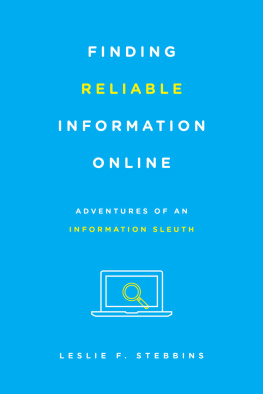
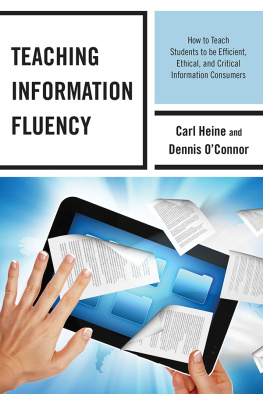
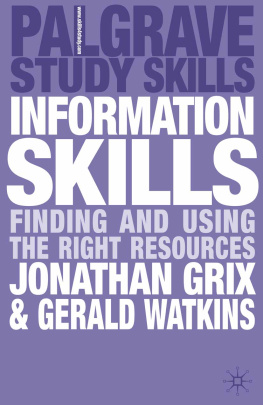

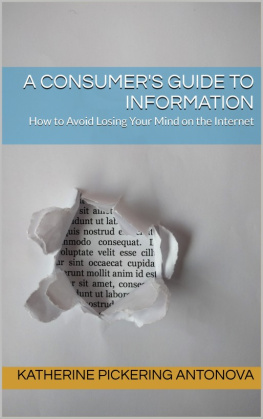
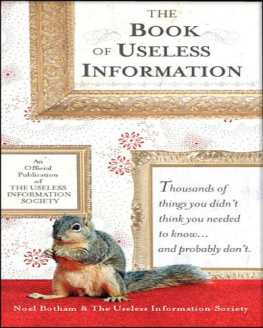

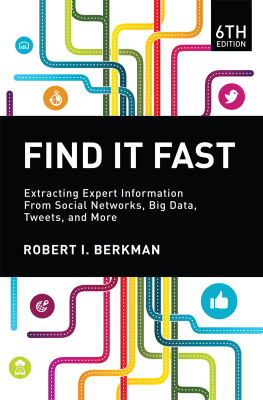
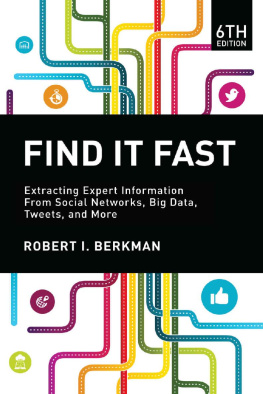

 TM The paper used in this publication meets the minimum requirements of American National Standard for Information Sciences Permanence of Paper for Printed Library Materials, ANSI/NISO Z39.48-1992.
TM The paper used in this publication meets the minimum requirements of American National Standard for Information Sciences Permanence of Paper for Printed Library Materials, ANSI/NISO Z39.48-1992.